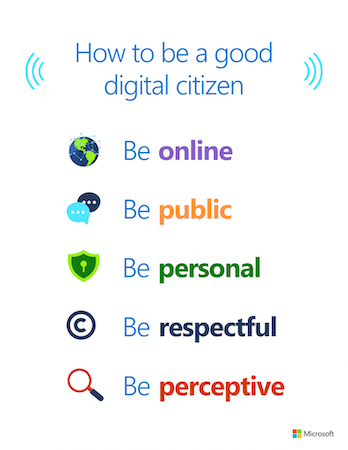Pedagogical view
In its simplest terms, pedagogy is how educators teach, including interactions that occur with learners in an educational environment. Meaningful interactions develop when educators approach topics in forward-looking ways, focusing on what students should do instead of focusing on what not to do. Teaching digital citizenship through a positive lens helps influence the growth of learners toward understanding their role in this digital age.
The International Society for Technology in Education (ISTE) believes in learner-driven teaching that empowers learner voice. ISTE’s standards for students confirm the pedagogical view of focusing on positivity in delivery. ISTE Standards highlight learning in a quest to empower learners, helping them discover who they want to be in a digital world.
Student standard 1.2, Digital Citizen, asks students to:
- Focus on managing a digital identity in a world with permanence.
- Engage in positive behavior online.
- Understand and respect intellectual property.
- Keep personal data safe.
Microsoft’s mission is to empower every person on the planet to achieve more. As educators, we can empower learners to embrace digital tools in positive, affirming ways while guiding them to avoid practices that diminish the power of technology.
The five “be statements” add meaning to discovering the importance of being good digital citizens. The statements are aligned with ISTE Student standard 1.2 and encompass the theme of empowering learners to achieve more. These five “be statements” are:
- Be online: Build awareness of how online time affects health and wellness.
- Be public: Analyze how to represent self when online to build and leave a positive digital footprint.
- Be personal: Connect with others safely.
- Be respectful: Follow copyright guidelines and recognize ownership of digital content.
- Be perceptive: Evaluate sources using digital literacy strategies, including understanding multiple perspectives.

Download the Be Statements poster: PDF | PNG